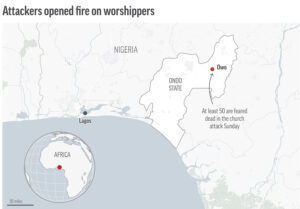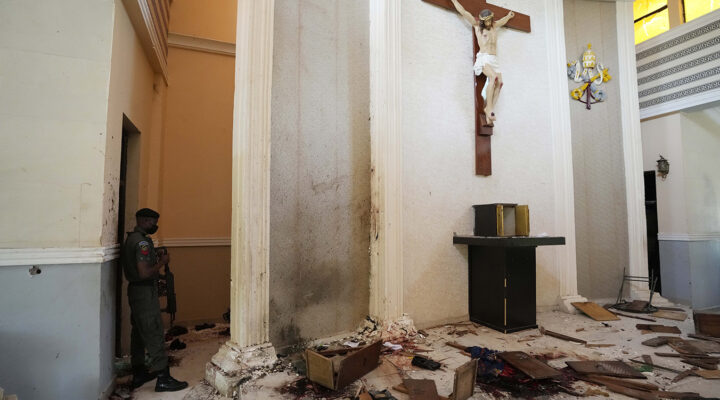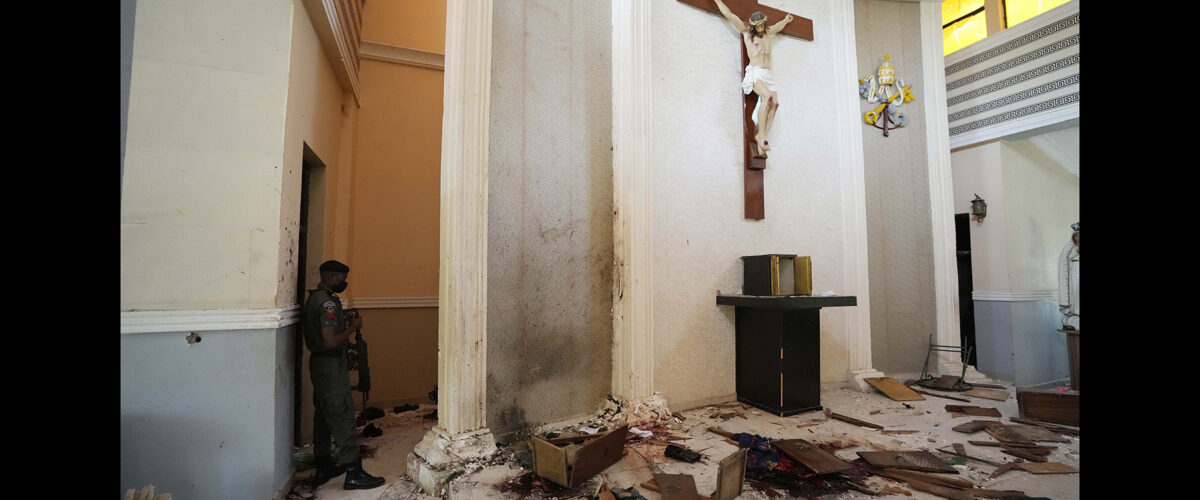In one of the most horrific, if not deadliest, terror attacks in Nigeria this year, scores of gunmen on Sunday morning, June 5, invaded and laid siege to a church and killed more than 50 worshippers.
The tragic event unfolded at St. Francis Catholic Church in Owo, Ondo State, which is located in southwestern Nigeria, on a day Christians marked as Pentecost, the birth of the church when the Holy Spirit descended in fire and wind.
Eyewitness accounts said the attackers stormed the church premises and detonated explosives. In the panic that ensued, some of the assailants ran into the church to kill while others positioned themselves outside and opened fire on fleeing worshippers. By the time they were done, visible inside and outside the church were dead bodies, wounded persons and trails of blood, amidst tales of anguish by survivors. Among the dead were children.
Andrew Abayomi, assistant priest of the church who officiated the mass that fateful Sunday, narrated what happened to Channels television: “Toward the close of the mass … I had told the people, go forth, the mass is ended, and they responded. It was during that moment that I heard, I would say, a noise. Like loud noise. Within me I was thinking like somebody fell, maybe a kind of commotion.”
He was wrong. “From the sanctuary, I saw one of us who would have seen from inside the church (what’s happening outside). … He quickly locked the door. From that moment, the message got to me that unknown gunmen, armed (were around). There is a place called the sacristy, it’s behind the sanctuary, so I told the people, come, and have your escape. Some were still waiting. I myself was in the inner room, with people (including) children hiding under my chasuble … they were trying to (say) ‘Father, pray pray.’ I said, ‘Calm down.’”
“I myself was in the inner room, with people (including) children hiding under my chasuble.”
He added that, within that moment, he heard explosions. “I heard about four explosions. I didn’t see their faces. Where I was, I was able to pick my phone (and) call the father in charge (of the parish). (I said), ‘Father, where are you?’ He said he’s still at this other place where he had gone to celebrate mass. I said, this is what is happening.”
One other witness said the gunmen fled after security officials, who had been alerted to the situation, arrived at the scene. Some accounts said the killers took some people hostage as they fled.
Reacting to the incident, Rotimi Akeredolu, governor of Ondo State, said it was a “vile and satanic attack” against the “peace-loving people of Owo kingdom.”
At press time, the identity of the attackers was yet to be established.
The Ondo State Police Command, in a statement signed by its public relations officer, Funmilayo Odunlami, said the State Commissioner of Police has “ordered forensic investigation into the attack to ascertain the actual or remote cause(s) of the attack and for immediate arrest of the assailants as all hands are on deck to forestall any similar attack in any part of the state.”

Authorities in southwestern Nigeria say gunmen killed at least 50 people at a church in Ondo State, Nigeria (AP graphic)
While the identity of the gunmen is yet to be known, the manner of the assault follows a pattern well established by Islamic terrorists in the country, who, for more than a decade now have maimed and snuffed life out of innocent people in different parts of the country, particularly the middle belt and northeastern regions.
Although Owo, and by extension Ondo, has enjoyed relative peace over the years, many parts of the middle belt region which it shares a border with do not.
States including Benue, Plateau, Kaduna, Yobe, Adamawa and Borno (birthplace of the Boko Haram insurgency) have borne the brunt of religious fundamentalism that has killed thousands of people, destroyed homes and farmlands and displaced millions from their communities. People of diverse faith in this multiethnic, deeply religious country of more than 200 million people have paid the price for religious terrorism with their lives.
Like many Nigerian towns, Owo is a cosmopolitan town where Christians, Muslims and traditional worshippers live together.
Apart from those who died in the church attack, many others are said to remain in critical condition in hospitals, while the fate of some believed to have been taken hostage by the assailants remains unknown. As part of efforts to save the wounded, the Nigerian Medical Association appealed to Nigerians to visit the hospitals where they are receiving treatment and donate blood.
After the tragedy, church leaders within and outside the country have commiserated with the victims.
The Christian Association of Nigeria, in a statement released by Pastor Adebayo Oladeji, media assistant to the CAN President, bemoaned the incident while saying masterminds of the massacre were agents of Satan.
“These people are possessed and demonic and are not working for the good of the country.”
“This is sad, wrong, condemnable, outrageous, unacceptable and satanic. There is no explanation for this unprovoked attack and assault on a place of worship. This is raw persecution. These people are possessed and demonic and are not working for the good of the country. May God descend heavily on them and fight the mindless agents of Satan from their roots in Jesus’ name.”
Pope Francis, in a message conveyed by Matteo Bruni, director of the Holy See press office, prayed “for the victims and for the country, painfully attacked at a time of celebration.” He entrusted “everyone to the Lord, that God might send his Spirit to console them.”
It remains to be seen whether those behind the Owo massacre will be apprehended, as Nigeria has a litany of unsolved high-profile crimes. A week before the church invasion, Samuel Chukwuemeka Kanu Uche, prelate of Methodist Church Nigeria, was kidnapped by gunmen along with two others. He regained his freedom after paying 100 million naira (about $240,000) to yet-to-be-identified kidnappers. While in the custody of his captors, the prelate had reached out to someone in his church to raise the money the kidnappers demanded.
Now, as Nigerians wonder about their country, and the ability of the country’s security operatives to foil and bring to book perpetrators of such evil, President Muhammadu Buhari remains upbeat about its future: “No matter what, this country shall never give in to evil and wicked people, and darkness will never overcome the light. Nigeria will eventually win.”
Anthony Akaeze is a Nigerian-born freelance journalist who currently lives in Houston. He covers Africa for BNG.
Related articles:
The struggle to rotate presidential power between Christians and Muslims in Nigeria
In Nigeria, the politics of religion and the search for peace are never-ending


